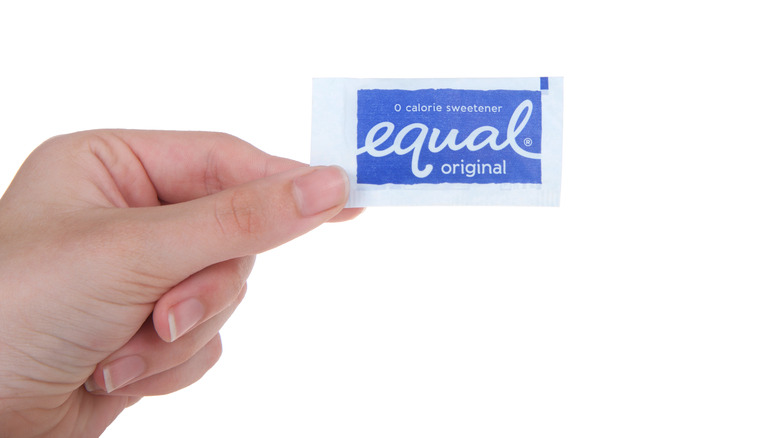Is Aspartame Bad For Your Health?
Most of us probably already know that eating too much sugar isn't healthy. Diets that are high in sugar have been linked to a number of negative health outcomes, including an increase in obesity, Type 2 diabetes, and heart disease, according to Medical News Today. Some studies have shown a link between too much added sugar and other health risks, like kidney disease and fatty liver diseases — it can even affect one's mental state, increasing the risk of developing dementia, a decline in cognitive function, and even depression. And, as our mothers might have already warned us when we were children, sugar is widely known to be bad for teeth, causing cavities and tooth decay.
In fact, the potential risks of eating too much sugar are so high that the dietary guidelines recommend that less than 10% of the calories individuals consume in a day should come from sugar, according to Healthline. As a result, many people try to cut back on sugar in their diet, creating a pretty big market for healthier sugar substitutes. There are quite a few products available that promise to sweeten food and beverages, without the added calories or other issues that sugar can cause, and that includes aspartame.
One study suggested a link between aspartame consumption and cancer
One of the most common sugar substitutes is aspartame, a sweet, artificial sugar alternative that was invented completely by accident in 1965. A chemist named James M. Schlatter was working on developing an anti-ulcer medication when two amino acids — aspartic acid and phenylalanine — got onto his hands. He then licked his fingers, only to realize that the amino acid substance, aspartame, was 200 times sweeter than regular sugar, according to Food Insight. Because aspartame was so sweet, it made a great sugar alternative, since such a small amount could be used rendering the sweetener essentially calorie-free. Commonly marketed under the names NutraSweet or Equal, it is now the most widely used sugar substitute on the market, found in products as varied as diet Coke and sugar-free candy to cough drops and even children's medicine, according to U.S. Right To Know.
It was approved by the FDA in 1974, but as early as 1987, some people began to question the health and safety of the sweetener. Perhaps the most famous critical aspartame study was conducted in 2005, when the European Ramazzini Foundation fed aspartame to rats over the course of their lifetime and discovered a link between their consumption of aspartame and an increased risk of cancer, according to Live Science. The results of this study sparked concerns that aspartame could potentially cause cancer in humans.
However, aspartame hasn't been linked to cancer in humans
However, the Food and Drug Administration, as well as independent researchers, took issue with the famous rat study. Subsequent research showed no link between aspartame consumption and increased cancer risk in humans, per WebMD. As of today, the FDA has confirmed that aspartame has not been linked to an increased risk of health problems, including cancer, setting the acceptable daily intake for the sweetener at "50 milligrams per kilogram...of body weight per day," per cancer.org.
But, while aspartame might not be linked to cancer or other significant health problems, whether or not it is really a "healthier" alternative than sugar is still up for debate. It does have far fewer calories than traditional sugar, making it a popular choice for people who are trying to lose weight. It has also been shown not to impact blood glucose levels, meaning it could potentially be a safer alternative for people with Type 2 diabetes, according to WebMD. However, these findings do come with some caveats.
A Yale study showed that aspartame, when consumed along with carbohydrates or fats, slowed down the body's metabolism, potentially hindering weight loss. Additionally, while it does not raise blood glucose levels, it does raise the body's cortisol levels, which can cause weight gain and insulin resistance, which could ultimately affect those with Type 2 diabetes. Thus, while aspartame might not necessarily be bad for you, it is still probably best to treat it much like traditional sugar and only enjoy it in moderation.


